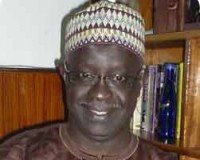
Ousmane Sene is the director of the West Africa Research Center in Dakar, Senegal. Scientific research is essential for the development of the African continent., a photo by Pan-African News Wire File Photos on Flickr.
Scientists urge AU, ECOWAS to support research
Tuesday, 02 August 2011 00:00
From Emeka Anuforo
Nigerian Guardian
THE West African Research Centre (WARC) has urged the African Union and the Economic Community of West African States (ECOWAS) to ensure that minimum standards are maintained in the laboratories of their research institutions.
The centre appealed to governments on the continent to encourage the emergence of a new crop of young scientists to complement the efforts of their old counterparts.
According to the centre, the conditions under which most of the young researchers work sometimes are not encouraging and thus the need for governments in the region to create the right environment for African scientists working abroad to come home and contribute to scientific development.
The WARC is tapping into the skills and experience of African scientists working in America, getting them to visit the region and conduct scientific researches into areas that are critical to the development of its people.
Through funding from its America-based parent association, the West African Research Association and a few other funders, WARC is promoting research in West Africa by West African scholars themselves, or by other scholars coming from overseas and specialising in West African issues.
Director of the centre, Ousmane Sene, told The Guardian in Dakar at the weekend: “Most of these Afro-American scientists are from U.S.-based universities and research centres. The areas of research are very diverse. They can come in and do researches in microbiology, in the health sector, in agriculture, in transferable technologies and other areas, which are of immediate need of the population of the region. Whatever researches researchers are doing should be able to go down to the population and use it to promote development.
“This strategy would be an excellent road to development of Africa, making sure that whichever research is produced, the end result is profitable to the grassroots population. It is one form of research that we are promoting. We promote research in the sense that we facilitate researchers: their coming to West Africa, their being in touch with research institutions and finding continuous space to conduct their researches.”
He spoke of a number of scholarships, which are also made available to researches operating within the West African region.
“A number of these scholarships are to promote intra-West African research. That is to say, from now on researchers applying for a research grant would have to have research topics, which would be implemented in West Africa. We are operating within the context of Africa. We do not want researches to be confined to the ivory towers. I do not like the idea of having researches being produced in terms of papers to be presented at conferences. If you get a travel grant, it means that that research project would be implemented with colleagues in West Africa research institutions,” he said.
He stressed that bringing Africans based in the U.S. to come and do research in science issues in West Africa did not necessarily mean they would stay back or relocate to the region, if they do not like this.
He called on countries within the region to create the right atmosphere for such scientists willing to go back to their countries to do so, as according to him, “we could convert what is often referred to as brain drain to brain gain.”
On how his centre is contributing to the raging issue of ageing African scientists, he said: “We are also giving young professionals the opportunity to take up more studies and develop themselves professionally, scientifically and come back to their communities and contribute to the communities in the areas of forestry, agriculture and other areas which are significant for development. We are also open to young members of the Diaspora who have any scientific research project idea for the West African region to come up and work with us.”
His words: “Though the scientists are ageing, they are progressively being replaced. Some people are saying brain drain, now we are witnessing brain gain. Many young Senegalese who have gone abroad to do their Ph.Ds, for instance, are coming back, because the conditions are improving. Many of those young researchers who have acquired knowledge abroad are willing to come back, if the conditions are okay. I remember that China’s economy was made possible because of the contributions of its Diaspora scientists. African countries need to improve the conditions for these young ones to come back and contribute to the development of the scientific community.”
No comments:
Post a Comment